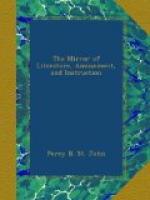“My flame (my ‘Donna,’ whom I spoke of in my former epistle, my Marianna) is still my Marianna, and I, her—what she pleases. She is by far the prettiest woman I have seen here, and the most loveable I have met with any where—as well as one of the most singular. I believe I told you the rise and progress of our liaison in my former letter. Lest that should not have reached you, I will merely repeat that she is a Venetian, two-and-twenty years old, married to a merchant well to do in the world, and that she has great black oriental eyes, and all the qualities which her eyes promise. Whether being in love with her has steeled me or not, I do not know; but I have not seen many other women who seem pretty. The nobility, in particular, are a sad-looking race—the gentry rather better. And now, what art thou doing?
“What are you doing now,
Oh Thomas Moore?
What are you doing now,
Oh Thomas Moore?
Sighing or suing now,
Rhyming or wooing now,
Billing or cooing now,
Which, Thomas Moore?
Are you not near the Luddites? By the Lord! if there’s a row, but I’ll be among ye! How go on the weavers—the breakers of frames—the Lutherans of politics—the reformers?
“As the Liberty lads o’er
the sea
Bought their freedom, and cheaply, with blood,
So we, boys, we
Will die fighting, or live free,
And down with all kings but King Ludd!
“When the web that we weave
is complete,
And the shuttle exchanged for the sword,
We will fling the winding-sheet
O’er the despot at our feet,
And dye it deep in the gore he has pour’d.
“Though black as his heart
its hue,
Since his veins are corrupted to mud,
Yet this is the dew
Which the tree shall renew
Of Liberty, planted by Ludd!
There’s an amiable chanson for you—all impromptu. I have written it principally to shock your neighbour ——, who is all clergy and loyalty—mirth and innocence—milk and water.
“But the Carnival’s coming,
Oh Thomas Moore,
The Carnival’s coming,
Oh Thomas Moore,
Masking and humming,
Fifing and drumming,
Guitarring and strumming,
Oh Thomas Moore.
The other night I saw a new play—and the author. The subject was the sacrifice of Isaac. The play succeeded, and they called for the author—according to continental custom—and he presented himself: a noble Venetian, Mali, or Malapiero by name. Mala was his name, and pessima his production—at least, I thought so, and I ought to know, having read more or less of five hundred Drury-lane offerings, during my coadjutorship with the sub-and-super committee.
“When does your Poem of Poems come out? I hear that the E.R. has cut up Coleridge’s Christabel, and declared against me for praising it. I praised it, firstly, because I thought well of it; secondly, because Coleridge was in great distress, and, after doing what little I could for him in essentials, I thought that the public avowal of my good opinion might help him further, at least with the booksellers. I am very sorry that J—— has attacked him, because, poor fellow, it will hurt him in mind and pocket. As for me, he’s welcome,—I shall never think less of J—— for any thing he may say against me or mine in future.




